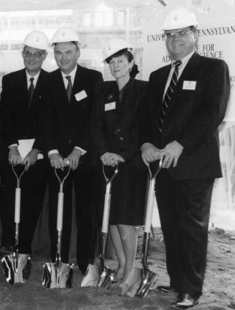
Dr. Cooperman continues as professor of chemistry and director of the French Institute.
This is a great day for Penn and in particular for research at Penn. In breaking ground for the Vagelos Laboratories, we are making a tangible commitment to a principle we have long espoused--that of the value and importance of interdisciplinary research.
A modern research university has two major functions: through its teaching programs, to prepare the coming generations for their responsibilities and opportunities as they go forth; and through its research programs to develop fundamental new knowledge, in part simply to enrich the human experience and in part to generate practical benefits for society.
Our organizational structure has historically been based on our teaching role; thus we divide our faculty into schools of medicine, of engineering, of arts and sciences.
But knowledge has no boundaries; and the challenge for Penn as a modern, research university has been to create mechanisms for pursuing research that overcome organizational boundaries, and allow collaborative efforts to thrive.
The Vagelos Laboratories will house chemists, engineers, and medical doctors. Through their joint efforts we can look forward to important new discoveries, particularly in the development of new therapeutic agents and materials, as experts in the synthesis and characterization of these new agents and materials, the chemists and engineers, are placed in a close working relationship with doctors seeking new solutions to unsolved clinical problems.
The site of the Laboratories themselves, which earlier provoked some controversy on campus, but which was maintained because of its optimum fit with program, can itself be recognized as a fitting metaphor for the importance of interdisciplinary research, situated as it is along the axis between the Medical School and the Physics Department, at the precise point of junction between the natural and biomedical sciences.
In formulating the research agenda of the Vagelos Laboratories the University has been mindful of its proximity to many of our nation's largest pharmaceutical and chemical companies. We fully expect that the research conducted in these laboratories, and the new young investigators, Ph.D.'s and postdoctoral fellows that are trained within its walls, will serve to increase the ties and cooperation between Penn and these companies, to the mutual benefit of all.
As the person who has shepherded the IAST since its inception, I want to extend my thanks to several people who made this day possible. To Roy Vagelos, Reg Jones and Don Langenberg, three trustees who early on understood the promise of the project and supported it; to Former President Hackney who approved its going forward under difficult circumstances; to several current and former members of the Pennsylvania Congressional delegation, in particular Representative Foglietta, who joins us today, and representatives Murtagh and Gray, who aided in securing federal funding; To Roy and Diana Vagelos for their generosity; and finally to President Rodin for the courage and vision she has demonstrated in making the final decision to proceed at a time of uncertainty regarding the future financial health of the scientific enterprise.

Deans at Work
At Friday's ceremony on the IAST site, Dr. Cooperman (left) joined the three deans whose faculties and students will collaborate in research in the Vagelos Laboratories: Dean Gregory Farrington, School of Engineering and Applied Science; Dean Rosemary Stevens, School of Arts and Sciences; and Dean William Kelley, School of Medicine. The target date for completion of the Laboratories is October 1997.
Photograph by Tommy Leonardi